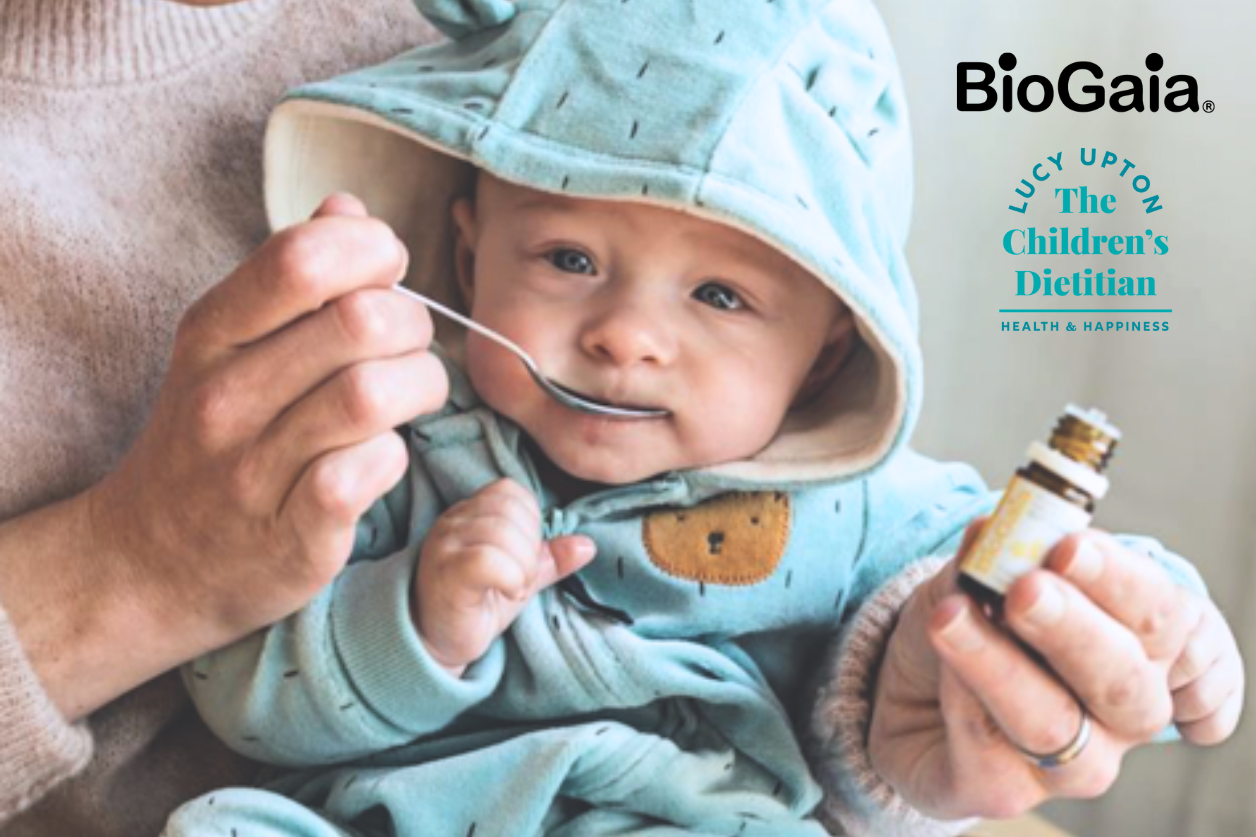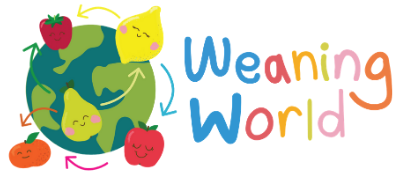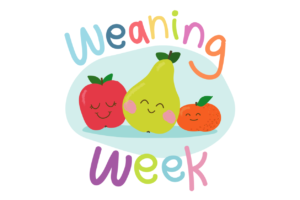
Supporting your baby’s gut health through weaning and beyond
By Lucy Upton, in partnership with BioGaia
Our gut health can have a direct impact on our overall wellbeing, so it’s important that we look after our microbiome. Every human’s gut is host to many trillions of microorganisms (e.g. bacteria, viruses, fungi, single cell animals). This is collectively referred to as the gut microbiome. There is a huge variety of different organisms, and it can be helpful to think of these like a ‘gut garden’ – with each needing slightly differing foods or environments to thrive. Most of the microorganisms present in our gut are beneficial (and vital) for our health. They have important roles such as digestion, immune function and disease prevention. Sometimes harmful bacteria can be present in the gut, which if present in large enough amounts, can cause illness or impact on health.
Every person’s gut microbiome is unique, and affected by a wide variety of factors. Diet has a significant role to play, which is why starting solids is such an important time of transition for your baby’s gut garden (they need to digest more than just milk now!) and establish a healthy balanced gut microbiome for life.
Your baby’s microbiome
For the first few months of life, your baby’s gut microbiome is shaped by factors such as method of delivery, milk feeds (e.g. breast or formula), medication use and even where you live.
Starting solids signals a time of change for your baby’s biome, as introduction of different foods supports a community of ‘new friends’ in your baby’s gut.
Research now shows us that there is a window of opportunity up to around three years of age, where a child’s ‘gut garden’ develops and diversifies. This can then have long lasting effects on factors like immune health and risk of disease
So, how can you support babies and children to grow a healthy gut garden?
Top tips for good gut health when weaning
1. Don’t get caught out by outdated advice
It’s still common to read that babies should be ‘introduced to one new food every 3 days’ during weaning, but this simply isn’t necessary for the vast majority of babies. In fact, this really can reduce how many foods babies are exposed to during this critical time. One new food every three days would be only 10 foods a month! Whilst common food allergens may be approached more cautiously, you can offer a wide variety of foods during weaning, which will help get those gut bugs diversifying!
2. Include a variety of plants
It’s well known that offering a balanced, nutrient-rich diet which includes a variety of plant-based foods can support a happy gut. Plant-based foods also offer a whole host of other benefits in the form of vitamins, minerals, antioxidants, healthy fats and more.
Great foods to include in your baby’s weaning diet can include fruits, vegetables, nuts and seeds (either in butter or ground), beans, legumes, herbs, spices and a range of grains. Remember, for babies and young children with small stomachs but high energy requirements, be sure to balance intake of fibre rich foods carefully with other key nutrients like iron, and high energy foods.
3. Pre- and Probiotics for gut health
These are foods which deliver beneficial bacteria to the gut (probiotic) or help feed the bacteria in your child’s gut (prebiotic). Naturally probiotic foods include yoghurt, tempeh and kefir, while natural prebiotics can be found in oats, onions, garlic, mushrooms, nuts, etc.
You can also ensure your child is getting enough probiotics to support their gut health through supplements. BioGaia is one such probiotic supplement that’s specially designed for infants and young children. Just 5 drops a day of their Protectis Baby Drops will support your little one’s microbiome, until they’re old enough to move on to the strawberry-flavoured, chewable Protectis Tablets for Kids.
4. Continue breastmilk wherever possible
Breastmilk has a hugely beneficial impact on a baby’s gut microbiome. A significant component of breastmilk, which doesn’t offer any nutritional benefit as such, are human milk oligosaccharides (‘HMOs’). These are a type of complex sugar that can’t be digested, which means they reach a baby’s gut and help feed specific types of friendly bacteria (Bifidobacterium).
There are also a wide range of other components in breastmilk which can support a healthy gut microbiome including lactose and immunoglobulins.
About Lucy Upton
Lucy (AKA The Children’s Dietitian) is an experienced Paediatric Dietitian and Nutritionist. She’s dedicated to helping families achieve happiness and health with food and nutrition, no matter what challenges may stand in the way. Lucy has an impressive array of knowledge and experience when it comes to weaning, front-line dietetics and nutrition, making her perfectly placed to offer support and advice to parents on the weaning journey. She has worked in both the NHS and private sector, as well as being an advisor in early years public health and a practitioner for a feeding clinic.
About BioGaia
With over 30 years of research behind them, BioGaia are a world-leading, Swedish probiotics brand providing award-winning supplements for the whole family. The Protectis range contains the bacteria strain L reuteri DSM 17938, derived from breastmilk, which has been clinically proven to improve gut health. In fact, it is one of the most researched probiotics in the world. To learn more about BioGaia, and to view their entire product range, visit their website.
Disclaimer: The views and advice given in this article are those of the guest writer and do not necessarily reflect the opinions of Weaning Week or any other organisations represented on this platform

